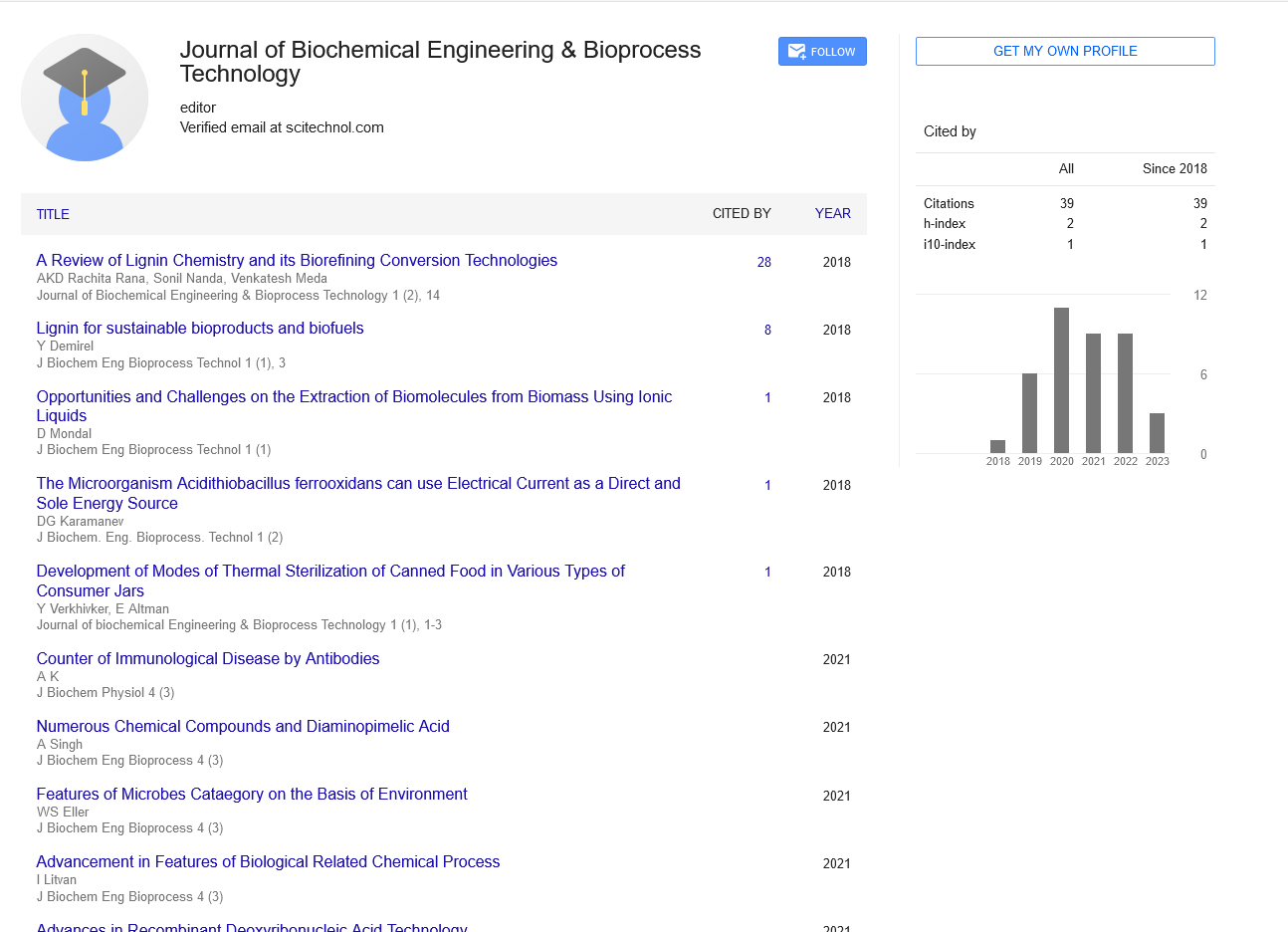Editorial, J Biochem Eng Bioprocess Vol: 4 Issue: 4
Segments of Petrol Isolated using Partial Refining
Joseph Philips*
Department of Biotechnology, California Institute of Technology U.S
*Corresponding author: Philips J, California Institute of Technology, U.S, E-mail: josephilips@gmail.com
Received date: July 1, 2021; Accepted date: July 16, 2021; Published date: July 22, 2021
Abstract
Petrol otherwise called raw petroleum and oil, is a normally happening, yellowish-dark fluid found in land arrangements underneath the Earth's surface. It is generally refined into different kinds of energizes. Segments of petrol are isolated utilizing a procedure called partial refining, for example partition of a fluid combination into divisions varying in edge of boiling over through refining, normally utilizing a fractionating segment.
Keywords: hydrocarbons
Introduction
Petrol otherwise called raw petroleum and oil, is a normally happening, yellowish-dark fluid found in land arrangements underneath the Earth's surface. It is generally refined into different kinds of energizes. Segments of petrol are isolated utilizing a procedure called partial refining, for example partition of a fluid combination into divisions varying in edge of boiling over through refining, normally utilizing a fractionating segment. It comprises of normally happening hydrocarbons of different sub-atomic loads and may contain various natural mixtures. The name oil covers both normally happening natural unrefined petroleum and oil based goods that are comprised of refined unrefined petroleum. A non-renewable energy source, petrol is shaped when huge amounts of dead living beings, for the most part zooplankton and green growth, are covered under sedimentary stone and exposed to both exceptional warmth and pressing factor. Oil has generally been recuperated by oil penetrating. Penetrating is completed after investigations of primary geography, sedimentary bowl examination, and supply characterisation. Late enhancements to advances have likewise prompted abuse of other offbeat saves, for example, oil sands and oil shale. Once removed, oil is refined and isolated, most effectively by refining, into various items for direct use or use in assembling, like gas (petroleum), diesel and lamp oil to black-top and synthetic reagents used to make plastics, pesticides and drugs. Oil is utilized in assembling a wide assortment of materials, and it is assessed that the world devours around 100 million barrels every day. Oil creation can be amazingly beneficial and was significant for financial improvement in the twentieth century, for certain nations, alleged "oil states", acquiring huge monetary and global force on account of their control of oil creation. Petrol misuse has critical negative natural and social outcomes. Most fundamentally, extraction, refining and consuming of oil fills all delivery enormous amounts of ozone depleting substances, so oil is one of the significant supporters of environmental change. Moreover, portions of the petrol business effectively smothered science and strategy that intended to forestall the environment emergency. Other negative ecological impacts incorporate the natural effects of investigation and misuse of petrol saves, for example, oil slicks, and air and water contamination at the locales of use. These ecological effects have direct wellbeing ramifications for people. Moreover, oil has additionally been a wellspring of contention prompting both state-drove wars and different sorts of struggles. Creation of petrol is required to arrive at top oil before 2040 as worldwide economies lessen conditions on petrol as a component of environmental change alleviation and a progress towards sustainable power and charge. This is required to have huge financial effects that partners contend should be expected by a simply change and tending to the abandoned resources of the oil business.
The interest for oil as a fuel for lighting in North America and all throughout the planet immediately developed. Edwin Drake's 1859 well close to Titusville, Pennsylvania, is prevalently viewed as the main present day well. Effectively 1858 Georg Christian Konrad Hunäus had tracked down a lot of petrol while boring for lignite 1858 in Wietze, Germany. Wietze later gave about 80% of the German utilization in the Wilhelminian Era. The creation halted in 1963, however Wietze has facilitated a Petroleum Museum since 1970. Notwithstanding, there was extensive action before Drake in different pieces of the world during the nineteenth century. A gathering coordinated by Major Alexeyev of the Bakinskii Corps of Mining Engineers hand-bored a well in the Baku district of Bibi-Heybat in 1846. There were motor bored wells in West Virginia around the same time as Drake's well. An early business very much was hand dove in Poland in 1853, and another in close by Romania in 1857. At around a similar time the world's first, little, petroleum processing plant was opened at Jas┼?o in Poland, with a bigger one opened at Ploie╚?ti in Romania soon after. Romania is the main country on the planet to have had its yearly raw petroleum yield formally recorded in worldwide measurements: 275 tons for 1857. The revelation at Oil Springs ignited an oil blast which carried many theorists and laborers to the space. Advances in penetrating proceeded into 1862 when neighborhood driller Shaw arrived at a profundity of 62 meters utilizing the spring-shaft boring technique. On January 16, 1862, after a blast of gaseous petrol Canada's first oil gusher came into creation, shooting into the air at a recorded pace of 3,000 barrels each day. Before the finish of the nineteenth century the Russian Empire, especially the Branobel organization in Azerbaijan, had started to lead the pack underway.
 Spanish
Spanish  Chinese
Chinese  Russian
Russian  German
German  French
French  Japanese
Japanese  Portuguese
Portuguese  Hindi
Hindi 